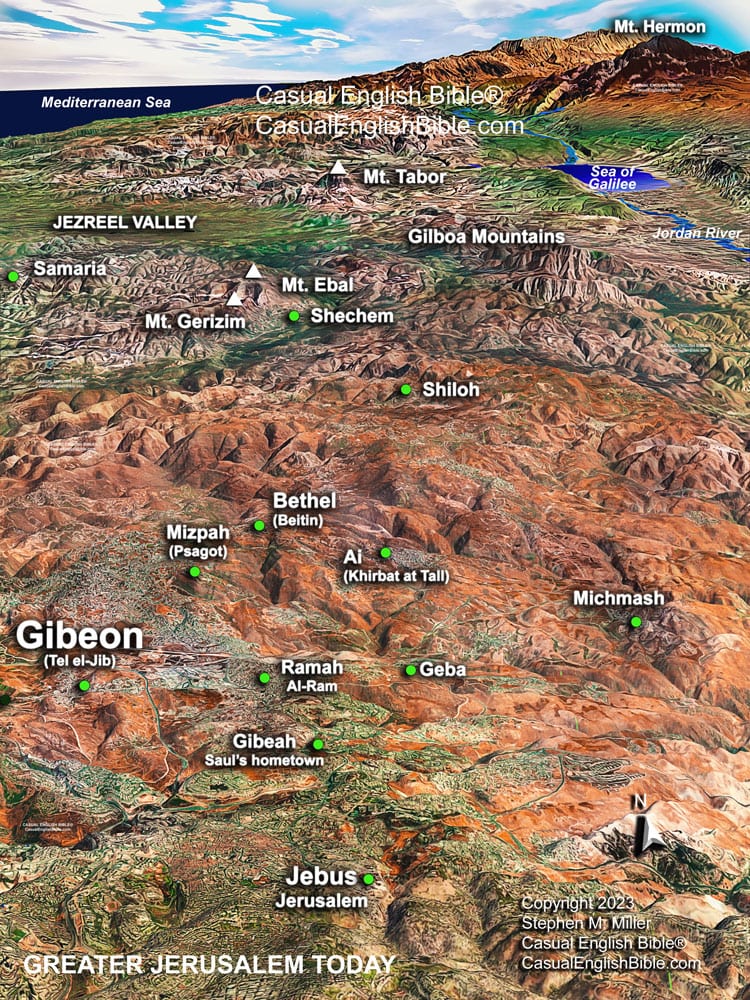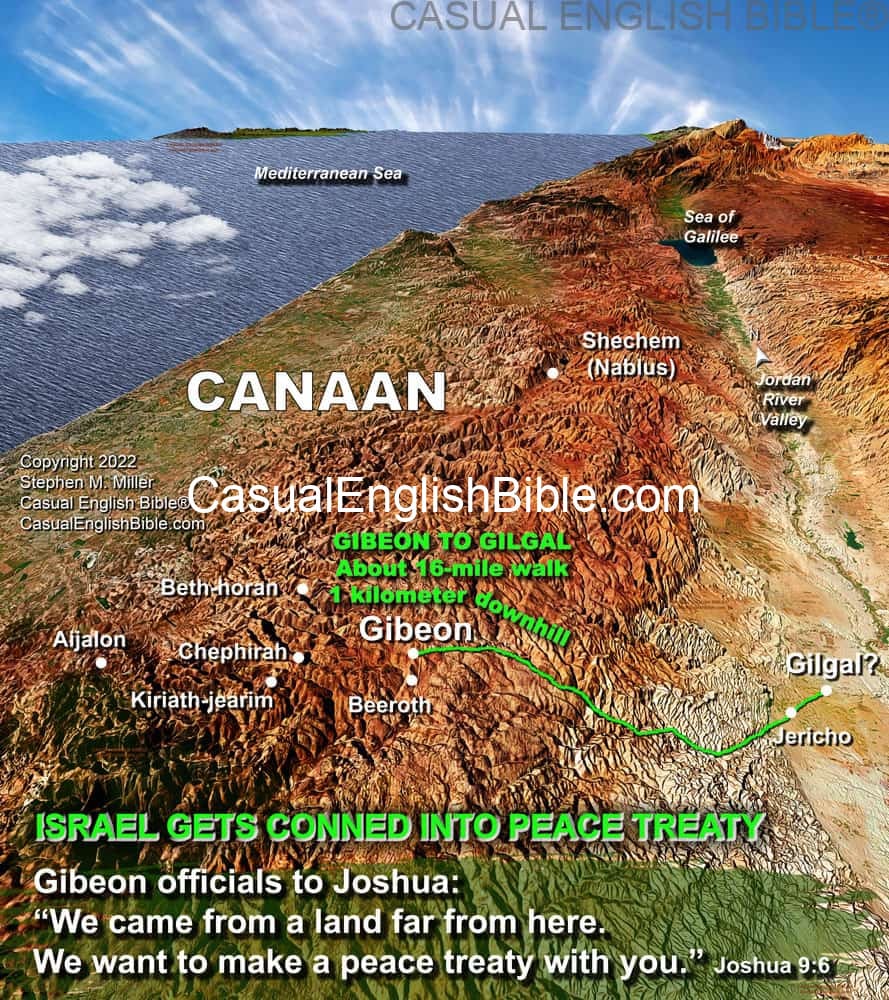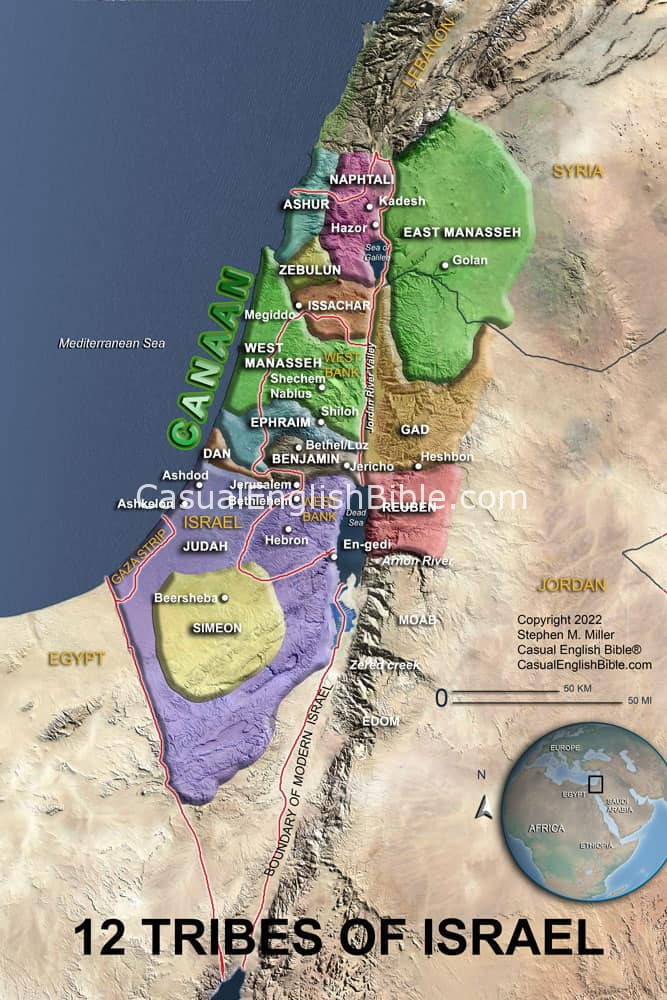2 Samuel 2
Civil war Battle of Gibeon
David settles in Hebron
1Later, David asked the LORD what he should do next. “Should I go back to my tribal homeland of Judah and find a city to live in?” The LORD said, “Yes, go up there.” [1] David said, “Okay, but what town?” God said, “Hebron.” [2]2David went to Hebron. He took both of his wives, Ahinoam from Jezreel [3] and Abigail from Carmel. Abigail was the widow of Nabal. 3David took his entire entourage—all the people who followed him along with their families. They settled in Hebron.
4People of Judah’s tribe came to Hebron and anointed David king of their entire tribe. Someone told David that people from Jabesh in Gilead had managed to recover Saul’s body and bury him.
5David sent ambassadors to the people of Jabesh in Gilead with this message: “May the LORD bless you with his kindness. May he do this for the devotion you showed to Saul, your king, when you buried him. 6I hope the LORD rewards you with the same love and devotion you showed your king. I certainly will. I’ll do this for what you’ve done. 7Stay brave and strong. Though your leader, Saul, is dead, the people of Judah have anointed me as their king.”
King Ish
8Israel’s commander, Abner [4] the son of Ner, escorted Saul’s surviving son, Ishbosheth, across the Jordan River to a place called Mahanaim. [5] 9Abner appointed Ishbosheth king over Israel. That included the people of Gilead east of the Jordan River, and those in the Jezreel Valley, and of the tribes of Ashur in Galilee, along with Ephraim and Benjamin in the central hills. [6] 10Saul’s son, Ishbosheth was 40 [7] years old when Abner made him king. He lasted two years. Judah’s tribe, however, followed King David.11David served as Judah’s king for seven and a half years.
Battle of Gibeon
12Abner marched the soldiers of King Ishbosheth out of Mahanaim, across the Jordan River, and to the banks of a pool at Gibeon. [8] 13David’s commander, Joab [9] son of Zeruiah, marched his men to the other side of the pool. So, the two groups took up positions on opposite sides of the pool.14Abner called out to Joab, “Hey, let’s have some of our men step forward and show us what they’re made of.” Joab agreed, “Okay, let them come.” 15Men stepped up and counted off. Generals limited the fight to a dozen men from each side—mortal combat, tribe against tribe. Twelve stood from Ishbosheth’s tribe of Benjamin and 12 from David’s tribe of Judah. 16Each man grabbed an enemy by the head and stabbed him in the side. They all fell together. That spot in Gibeon became known as Flint Field, for the blades that fell on the ground.
17The battle that followed was intense. David’s men won, defeating Abner’s army.
Running retreat
18David’s sister, Zeruiah, had three sons: Joab, Abishai, and Asahel. Asahel ran like a wild gazelle. 19He targeted Abner, who was retreating from the lost battle. Asahel refused to fight anyone else. He kept eyes on his bullseye, the enemy commander running away.20Abner looked back and yelled, “Is that you, Asahel?” He said, “You bet it’s me.” 21Abner said, “Go after one of these other men and take what you want.” Asahel kept gaining on him.
22Abner said, “Pick someone else. I don’t want to kill you. If I do, how could I ever face your brother Joab?” 23Asahel kept running. He ran right into the butt end of Abner’s spear. It bore through his stomach and broke through his back. Asahel, David’s nephew, dropped dead. When fellow warriors came to his body, they stood for a time in silence.
Joab’s trumpet ends battle
24Joab and his brother Abishai took off after Abner. They and their army reached the hill of Ammah just before sundown. The hill isn’t far from Giah, on the trail to the desert wasteland near Gibeon.25Warriors from Abner’s tribe of Benjamin formed a protective wall in front of him. They would make their stand at the top of a hill. There, they intended to fight Joab’s army again. 26Abner yelled to Joab, “How long will you let your swords feed on your own family?”
27“All night long,” Joab yelled back. “As God is my witness, if you had not asked me to stop, my men would have fought you till dawn.” 28Joab blew a ram’s horn, signaling his men to stand down. That’s how the battle ended.
Dark walk home
29Abner and his men retreated to east of the Jordan River. They traveled all night and into the next morning before reaching Mahanaim. 30Joab stopped chasing Abner. He returned home, less 20 men, counting his brother Asahel. 31But his fighters, David’s army, killed 360 of Abner’s men.31Joab’s men recovered Asahel’s body. And on the road home to Hebron, they stopped in Bethlehem to bury Asahel in the family tomb. Afterward, the army traveled all night before arriving in Hebron about dawn.
Footnotes
“Go up” refers to altitude. David had been hiding most recently in low-lying coastal and desert towns of Gath and Ziklag. Cities of Judah were up in the hills. That included the city of Jebus, which would later become known as the City of David, and then later as Jerusalem. Whenever Bible writers talk about going to Jerusalem, they say they’re going “up to Jerusalem.” That’s because travelers couldn’t get to Jerusalem without climbing.
Hebron was about 15 miles (24 km) south of David’s birthplace of Bethlehem.
There was a town called Jezreel in the Valley of Jezreel in what is now northern Israel. But some scholars say this Jezreel was more likely a town down south, in the tribe of Judah and near the town of Carmel (see Joshua 15:55-56).
Abner was Saul’s cousin (1 Samuel 14:50). He was also the new alpha and the kingmaker in the surviving leaders of Saul’s court.
Mahanaim was near Jabesh in Gilead and the Jabbok stream. The Israelites probably retreated east of the Jordan River because Philistines controlled Saul’s land west of the Jordan after they crushed Saul’s army at the Battle of Mount Gilboa (1 Samuel 31).
This verse has some background added. More literally, the verse simply lists the place names: Gilead, Ashur, Jezreel, Ephraim, Benjamin, all Israel.
Bible writers often used “40” as a symbol. It could mean a generation, a long time, or that a person was a grown man, and not necessarily 40 years old. Whatever Ishbosheth’s age, he survived just two years. A pair of his soldiers assassinated him. When they took that news to David, expecting a reward, he killed them. David wasn’t fond of people who killed kings. He was one.
Gibeon was a town on the northwestern outskirts of what is now Jerusalem. Centuries earlier, Gibeon citizens survived the Israelite invasion by tricking Joshua into a peace treaty (Joshua 9).
David was Joab’s uncle. Joab’s mother was Zeruiah, David’s sister (1 Chronicles 2:15-16).
Discussion Questions
- Sorry, there are currently no questions for this chapter.











